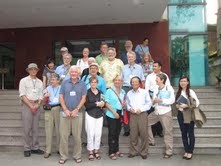(VOVworld)- Many American war veterans have returned to Vietnam to heal the war wounds. Each day, they try their best to do whatever they can to ease the pain caused by the American war in Vietnam. On the occasion of the 38th anniversary of the total liberation of the south and national reunification, VOV editor Anh Huyen writes a report “Bridging reconciliation, vanquishing the tragedy of war”.
In the last 25 years, Roy Mike Boehm has returned to Quang Ngai province in every March. Standing by the Son My Memorial Monument, the American war veteran played his violin to pray for the souls of the 504 innocent victims of the 1968 massacre. Mike Boehm says that by so doing, he can feel some relief from the feeling of guilt. Over the past years, Mike Boelhm has always wanted to heal the war wounds. He called on friends in many countries to contribute to building schools and donating teaching aids to students in Son My, as well as building charity houses for thousands of Agent Orange/Dioxin victims in Quang Ngai.

Suel Jones visits Friendship Village |
The President of the Veterans for Peace Suel Jones has also retuned to Vietnam to aid the healing process. He was an infantry soldier in Quang Tri battlefield from 1968 to 1969. First returning to Vietnam in early 1998, his worries about coming back was quickly replaced with surprise at the Vietnamese people’s friendliness and generosity. Back to the US, Suel traveled around universities and cities in the US to talk about Agent Orange in Vietnam and the aftermaths of the war. In 2000, Suel returned to Vietnam as a representative of the International Committee of Friendship Village and since then, has traveled back and forth between the US and Vietnam to pursue his goals. Suel says: “People think the war in Vietnam is over, but it isn’t over. We’ve spent a lot of time educating about Agent Orange, about landmines, about people who are today still live in worried zones. Part of my job is to educate and educate. Our job is to educate people in the USA about what really happened in Vietnam and what’s still happening over here”
30 years after Vietnam’s Reunification, in 2005, Suel Jones and many other American war veterans wrote an open letter calling for the American people to sign a commitment to share the pain of war with Vietnamese people and join in efforts to build peace and friendship between the two nations. Since 2008, American war veterans have stood side by side with Vietnamese Agent Orange/Dioxin victims in their pursuit of justice. Mike Marceu, Vice President of US Veterans For Peace, says: “We have legislation pending in front of the Congress in the USA. So what we are doing now is gathering information. We’ll make a report to the Congress and let them known, for instant, how many children are really affected. Our job now is to gather information to learn as much as we can to educate our own Congress and people in the US about what’s still happening in Vietnam, just because when the Americans left Vietnam, the war still continued. So we are educating and educating to let people know that when the Americans went home, the war didn’t end and we must continue helping”.

American war veterans return to Vietnam |
For some American war veteran, Vietnam is still remembered as a land of terrors of bombs and mines nearly 40 years ago. However, since the war ended 38 years ago and since the two countries normalized bilateral relations 18 years ago, many American veterans have returned to Vietnam. The more often they go, the more they realize that the war was nonsense and that they should do something to help heal the wounds of that war. What impresses them most is the Vietnamese people’s warmth, generosity of spirit and friendliness. Suel Jones says: “I tell people in America that I was born in Vietnam in 1968, grew to the person I am today. Every minute in my life I’ve being living is affected by Vietnam. That’s why I tell people I was born in Vietnam. Though I don’t look Vietnamese, I still see my hearts in many ways as Vietnamese. Now, when I come back, I realize how deeply this country has changed”.
“We cannot change the past, but we can change the future”. This statement is included in the open letter that Suel Jones and his American friends sent to Vietnam. Yes, it’s true that the American veterans can’t do anything to change the past and the tragedy of war, but they can take action to create a better life for future generations. This is what American war veterans like Suel Jones, Mike Marceau, Roy Mike Boehm and many others have been doing and will continue do to help overcome their own bad memories and help to bring Vietnam and America closer together.
Anh Huyen